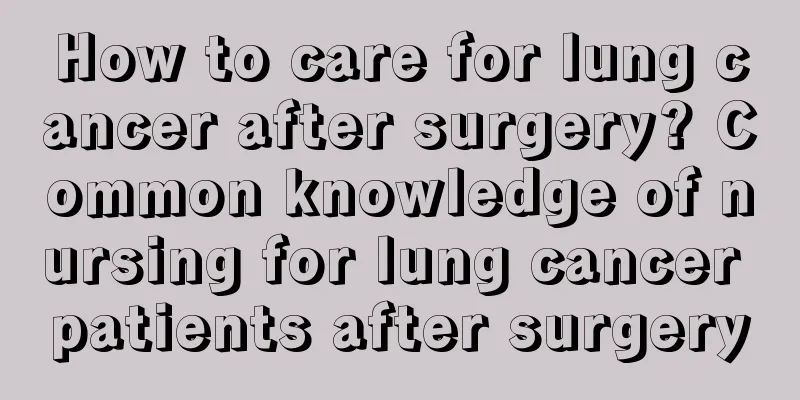How to care for lung cancer after surgery? Common knowledge of nursing for lung cancer patients after surgery

|
The arrival of lung cancer is unexpected for many patients. In recent years, many people in our country have paid close attention to this disease, because lung cancer is very harmful to patients. Clinically, patients must understand some postoperative care knowledge. So what are the common sense of postoperative care for lung cancer patients? Please see the detailed introduction below. Common knowledge of nursing care for lung cancer patients after surgery: Postoperative care for lung cancer patients is very important for their recovery after treatment, so we must do a good job of nursing. If postoperative care is not done well, it will not only affect the patient's health recovery, but may also cause the cancer cells to spread and metastasize, causing the disease to recur. Therefore, we must take good care of the patients to achieve recovery effects. Pay attention to expectoration. After lung cancer surgery, patients should actively perform respiratory rehabilitation exercises to prevent atelectasis and respiratory system infection. Within 24 to 48 hours after surgery, patients should actively cough and take deep breaths 5 to 10 times every one or two hours. Within 3 days after surgery, nurses or family members should help patients cough and expectorate 4 to 6 times a day. The specific method is: stand on the non-surgical side of the patient, stretch out your arms, put your fingers together, and hold the patient's chest on the surgical side from the front and back chest walls, and let the patient follow you to take a deep breath. When inhaling, gently hold the incision, and then ask the patient to cough hard, press the ribs when coughing to help expectorate, and gently pat the patient's back. Repeat several times until the patient coughs up all the sputum. On the third day after surgery, encourage and urge the patient to use the arm on the operated side to hold a cup, eat, and comb hair, and to use the hand on the operated side to touch the ear on the opposite side over the head several times a day. A rope can be tied to the end rail of the bed, and the patient can pull the rope with the arm on the operated side to practice sitting up, lying down, and getting out of bed by themselves, which can enhance the muscle tension of the shoulder, arm, and back muscles on the operated side. Dietary conditioning is also very important for postoperative care. Patients must pay attention to their eating habits. The diet of lung cancer patients after surgery should be relatively easy to solve. At this time, it is advisable to choose milk, eggs, lean meat, animal liver, soy products, fresh vegetables and fruits, etc., and appropriately increase the patient's food intake and frequency of eating. At the same time, it is necessary to avoid fishy and greasy foods, spicy foods, tobacco, alcohol and other irritating foods. For lung cancer patients with coughing and hemoptysis, you can choose prescriptions and food prescriptions that nourish the lungs, stop coughing and stop bleeding, and astringe under the guidance of a traditional Chinese medicine practitioner. Choose almonds, jellyfish, lilies, water chestnuts, lotus nodes, lotus seeds, persimmons, pears, yam, etc. Lung cancer patients can also eat foods that nourish yin and nourish, such as geckos, tortoise plaster, turtle meat, and glutinous rice. This article has given you a detailed introduction to the common sense of postoperative care for lung cancer. Now all patients should know how to do daily care. Don’t be overly pessimistic if you have lung cancer. Timely treatment, correct care, and an optimistic attitude are conducive to recovery from the disease. |
>>: What are the causes of liver cancer? 5 reasons that can easily induce liver cancer
Recommend
Fasting refers to how long you don't eat
Fasting refers to 4 to 5 hours after a meal, whic...
Why do I feel dizzy when spinning in circles
Turning in circles is a manifestation of people&#...
What are the symptoms of advanced colorectal cancer
In recent years, cancer has become one of the maj...
Common symptoms and precautions of glans eczema
Balanus eczema is not affected by seasons and is ...
What foods can cause liver cancer? Eating these two types of food often can easily induce liver cancer
Liver cancer is a malignant tumor of the liver. m...
What should we pay attention to in case of allergic purpura? You should know these things
Allergic purpura, also known as hemorrhagic capil...
What are the examination items for early lung cancer? Five examination items for early lung cancer
No matter what the disease is, the earlier the di...
Could pain inside the nose be nasopharyngeal cancer?
Could pain inside the nose be nasopharyngeal canc...
What does it mean when the mucus is high in urine routine tests?
When doing a routine urine test, if the mucus thr...
Use these Chinese patent medicines to quickly get rid of cold and dampness
People's bodies will suffer from frequent col...
Why do I feel weak right after waking up
The condition of general weakness is indeed quite...
Are fibroids harmful?
Is fibroid very harmful? This is a question that ...
How to prevent black moles on the face
Black moles can appear anywhere, but recently man...
Are blue veins arteries or veins
Everyone will have blue veins on their arms or le...
What medicine should I take for skin cancer ulcers
What medicine should I take for skin cancer ulcer...









